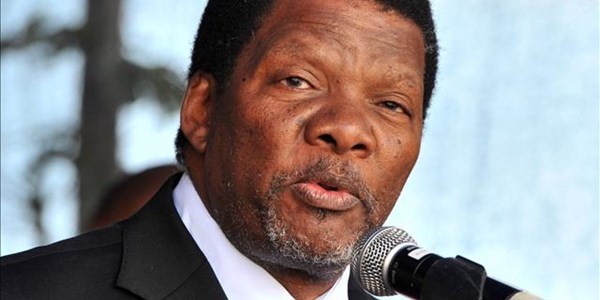National
Nkwinti outlines farm ownership changes─── 07:47 Wed, 27 Apr 2016

Land Reform Minister Gugile Nkwinti (Gallo images)
Cape Town - The government was setting up a range of measures to change the ownership patterns of commercial farms without affecting production and food security, the National Assembly heard on Tuesday.
The ambitious plans included a proposed law that would restrict ownership to 5 000 hectares for large scale farmers and stop foreign ownership of land; a network of Agri-Parks that would equip and support small scale farmers and a "50/50 policy" in which farm owners would enter into partnerships with their employees.
Rural Development and Land Reform Minister Gugile Nkwinti and his deputies, Mcebisi Skwatsha and Candith Dlamini-Mashego, outlined some of these details during the department's debate over its R10.124bn budget for the 2016/17 period.
These included the Regulation of Agricultural Land Holdings Bill, which, if passed, would limit hectarage to 1 000 hectares for small scale commercial farmers, 2 500 for medium scale and 5 000 for large scale commercial farmers.
Foreign ownership of commercial agricultural land would no longer be allowed if the law was passed, but current foreign owners would not be deprived of their land because the law would not act retrospectively.
"We don't want to drive away people already investing. Our approach is to grow the economy through redistribution. Because if we don't redistribute the land there is a going to be trouble with the economy going forward," he said, explaining the Bill was with the state law advisor and would then go out for public comment.
Around 143 000 new land claims have been lodged since the land claims process was reopened to give claimants a second chance after the first phase closed in December 2008.
50/50 policy
Nkwinti said the previous method of simply transferring land to workers or claimants had led to production standing still in many cases. This was because the new farmers did not have the financial support, equipment and business training they needed.
But with the 50/50 policy, new farmers would be able to ease into the process.
Government would buy a portion of commercial farm land and hand it to the workers to farm. The government would initially own the workers' percentage of the land.
The previous owners would keep a percentage of their land in a split that would be around 50/50, but which was flexible. The previous owners of the full portion of land would be expected to teach the shareholders how to manage a farm.
A number of white and black farmers already in the 50/50 programme attended Nkwinti's press conference afterwards.
The 50/50 programme is funded by the National Empowerment Fund (NEF), which has been teaching the first recipients of the programme how to set up a company, the rights and responsibilities they have as shareholders and running mentorship programmes.
Mastered farming New company entities would be registered and the NEF would ensure that benefits accrue to the rightful farmers and members of the community. NEF CEO, Philisiwe Mthethwa, said at a subsequent press conference fair prices would be paid for farms, and the new farmers would not be allocated "dogs" in terms of commercial viability.
The new farmers would initially pay rent for their portion of land, and when they were able to show that they had mastered managing the farm and were bringing in some profits – usually around five years – they would have the option to buy their portion from the government. Support for emerging farmers would include being connected to a network of 44 Agri-Parks around the country. A network of small scale farmers would be helped with equipment, knowledge from universities and they would tap into a network of shared support services such as transport logistics and storage facilities. "We don't want those businesses to collapse," said Nkwinti.
He denied government was nationalising land, as claimed by Freedom Front Plus MP, Pieter Groenewald, earlier in the National Assembly. Groenewald said the state claimed over 80% of the land was in the hands of whites, but actually the government owned most of the land because new ownership was not passing to black farmers. He added that around 43% of land claimants were opting for a cash payout.
Groenewald said that because the new black farmers put in place by the government do not yet own their land they battled to raise loans because they couldn't offer surety. Nkwinti explained that because ownership of the land of the apartheid-era bantustans was transferred to the new government at the advent of democracy, in a province like KwaZulu-Natal the government did own more land than the private sector if Ngonyama Trust land was included. "In 1994 all bantustan land was transferred to Pretoria to the department of land affairs so now we inherited that land," he said."We can't inherit all the land [that came from a bantustan] as a government and then say we only own 8%. That's what he means. He knows that with that he is right," said Nkwinti.
-News24.com













